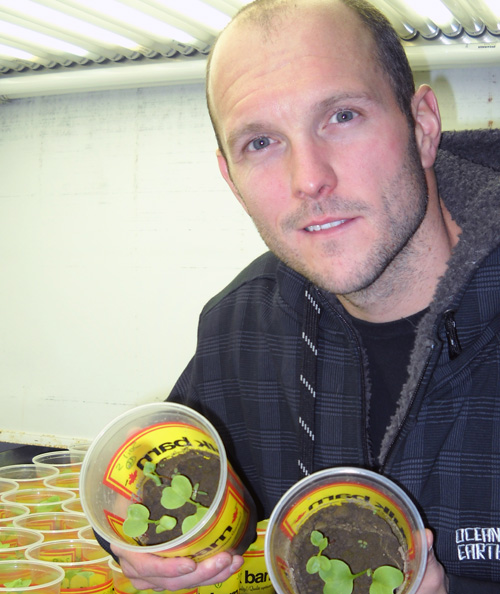
Clean hands, contaminated food? Research intended to learn whether a chemical found in soaps and shampoos might pose a food health threat earned an international award for a Guelph doctoral student this month.
Ryan Prosser says his studies so far suggest consumers need not worry about eating vegetables, although he’s continuing to look at possible effects of triclosan on “good” soil microbes.
This fall, the student in Guelph’s School of Environmental Sciences (SES) used a travel award from the Society of Environmental Toxicology and Chemistry to attend the group’s North American conference in California.
There he discussed his studies of triclosan, a chemical in antibacterial soaps and shampoos and other personal care products. The substance kills microbes and fungi and has been used since the 1970s.
As with some pharmaceuticals and compounds from personal care products, triclosan has shown up in biosolids from sewage treatment plants.
Biosolids are the materials left after sewage is treated and water is removed. Biosolids meeting provincial standards are routinely added as fertilizer to farm fields.
Treated biosolids are used by farmers around Guelph, says Prosser. Under provincial law, farmers, municipalities and treatment plant operators must develop plans for applying biosolids and nutrients to farmland.
Unlike other chemicals, triclosan often passes through treatment without breaking down, says Prosser. “It tends to accumulate in solid waste and persists even after treatment into biosolids.”
It’s found in relatively higher concentrations than those of other chemicals in biosolids and is detected more often. Those amounts are still much lower than in personal care products such as mouthwash or soap, says Prosser, and triclosan is broken down rapidly by soil microbes.
One study of sewage treatment plants by the Canadian Council of Ministers of the Environment found triclosan in eight out of 10 samples. A related compound – triclocarban – appeared in all samples.
Scientists don’t know whether the substance poses a health threat at detected concentrations.
“Recent studies using cell culture exposed to triclosan show that it may have endocrine-disrupting properties but at concentrations much higher than would be detected in the environment,” says Prosser.
Endocrine disruptors affect hormones and may damage health in animals and humans.
Health Canada regulates triclosan concentrations in personal care products but not triclocarban.
Prosser studies how plants take up triclosan from soil treated with biosolids. “We know it’s in biosolids, but is it taken up into the edible portion of the plant? It’s that unknown exposure people worry about.”
His preliminary results showed little evidence of chemical uptake in radishes grown in the lab and the field. He plans to look at other vegetables and crops.
Paul Sibley, a professor in SES, says it’s too early to say how much of the chemical people are consuming in vegetables. But, he says, “The data obtained so far strongly indicate that exposures are likely to be negligible. We believe that this is developing into a good-news story.”
Prosser also plans to look at how these compounds might affect soil microbes, particularly beneficial fungi. Referring to the latter, he says, “They form important symbiotic relationships with a lot of crop species.”
Originally from Guelph, he studied biology at Queen’s University and taught in Kuwait for five years. Back in Canada, he completed a second undergrad degree in toxicology at Guelph.
He began his PhD last fall with Sibley. His co-adviser is SES professor emeritus Keith Solomon.
This research is supported by the enhanced partnership between U of G and the Ontario Ministry of Agriculture, Food and Rural Affairs.